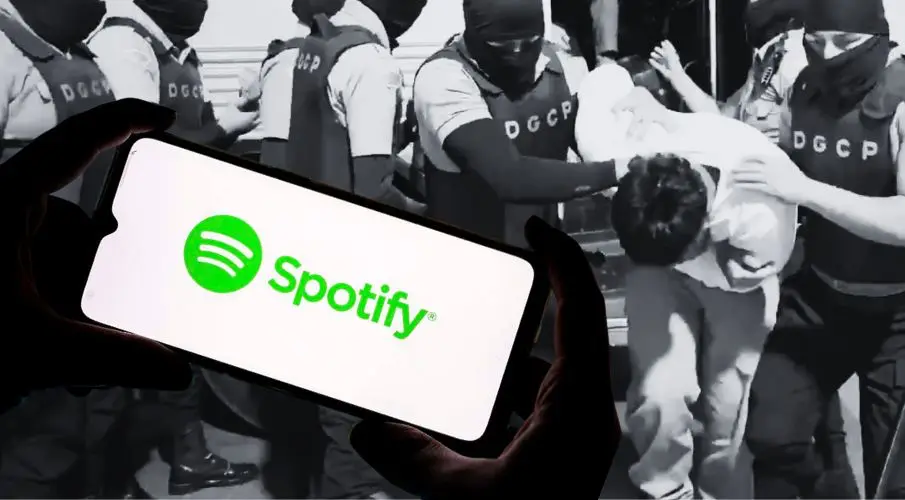Between two songs, a voice suddenly appears. It sounds factual, almost friendly, but the message hits: “In too many cities, dangerous illegals walk free. Join ICE - with bonuses of up to $50,000 and generous benefits.” Then Spotify continues to play music as if nothing happened. Our research shows that in 2025 Spotify did in fact run recruitment advertisements for the U.S. agency Immigration and Customs Enforcement (ICE) - and that the streaming service is part of a larger U.S. government advertising campaign. Spotify confirmed the matter, pointed to the compliance of the content with its guidelines, and emphasized that the advertising is part of a “broad government campaign” across multiple platforms ...
In fact, Spotify is not alone. Further research suggests that Meta, YouTube, Pandora, HBO Max, and Hulu have also shown ICE recruitment ads according to users. What initially seemed like an internet rumor has now been confirmed. And it has consequences - above all for the self-image of a platform that likes to present itself as progressive and culturally open.
The music scene reacted quickly. The punk label Epitaph Records publicly called for an immediate stop to the ICE ads. Artists and fans, it said, deserve platforms that “reflect the values of the culture they sustain.” Other labels and musicians joined in. On social media, boycott calls and recordings from the app proving the spot circulated widely.
When asked for comment, Spotify remained calm. The ads, a spokesperson said, did not violate company policy. Users could mark advertising with a “thumbs down” to adjust future preferences. That the advertising comes from a security agency known for deportations, detention centers, and nighttime raids apparently plays no role in the system, since the advertising revenue is lucrative - apparently it does not matter that some Spotify listeners may be innocently deported. The campaign itself, further research showed, was delivered through the ad network The Trade Desk - a platform that distributes ads for hundreds of apps and streaming services. Which spots appear is decided not by an editor but by an algorithm. Advertising there is distributed like water: by budget, reach, and target group, not by content.
The Department of Homeland Security, which oversees ICE, considers the effort a success. Tricia McLaughlin, deputy DHS secretary, spoke of more than 150,000 applications from “patriotic Americans answering the call to defend the homeland.” In Google’s Ads Transparency Center and Meta’s Ad Library, nearly identical ICE ads appear - first at the end of August, most recently on October 20. That state propaganda in streaming advertising barely attracts attention is due to the medium itself. Between music, podcasts, and product spots, the boundaries blur. A recruitment ad seems like just another algorithmically inserted ad block - the same voice, the same tone, the same technical neutrality.
Spotify has confirmed the matter but has seen no reason to make changes. For the company, the advertisement is legal and compliant. For the government, a success. For the public, one sentence remains: Between two songs, an agency is recruiting people to arrest others.
Investigative journalism requires courage, conviction – and your support.
Please also strengthen our journalistic fight against right-wing populism and human rights violations. We do not want to finance ourselves through a paywall so that everyone can read our research – regardless of income or origin. Thank you very much!


Gut das zu wissen. Danke für die Arbeit, die ihr euch macht.
dankeschön
Ich bin nicht bei Spotify, aber spätestens jetzt würde ich sie boykottieren.
Unglaublich, wie viele Unternehmen sich an der Förderung eines faschistischen Regimes beteiligen.
Ohne Scham, ohne Reue.
Nur mit dem Hinweis, dass es Gesetzes- und Richtlinienkonform ist.
Der moralische Kompass ist schon längst über Bord gegangen.
Was mich erschreckt ist die immense Zahl der ICE Bewerber.
Menschen ohne jegliches Gewissen. Hinterher (falls es ein hinterher gibt) heißt es dann „wir haben nur Befehle befolgt“.
Stimmt es, dass viele Prüfungen (wie Fittness, früherer Drogenkonsum, Vorstrafen etc) nicht mehr konsequent erfolgen?
Sicher weißt Du da mehr.
Ja, das stimmt leider. Seit der Neuordnung unter der Trump-Regierung wurden mehrere Sicherheits- und Eignungsprüfungen bei ICE deutlich gelockert. In internen Memos, die uns vorliegen, ist von „accelerated hiring procedures“ die Rede – also beschleunigten Einstellungsverfahren. Hintergrund ist der massive Personalbedarf durch die landesweiten Massenrazzien.
Wie steht es denn eigentlich gerade um die personelle Aufstellung bei ICE? Haben sich tatsächlich so viele Rekruten finden lassen? Bei den genannten 150000, kommt ja eine horrende Summe an Steuergeldern zusammen .
hi, hier ein link eines artikel von uns, der da weiterhilft: https://kaizen-blog.org/wer-sind-die-personen-mit-den-masken-wie-trump-zehntausende-ermittler-von-echter-polizeiarbeit-abzieht/
Danke dir